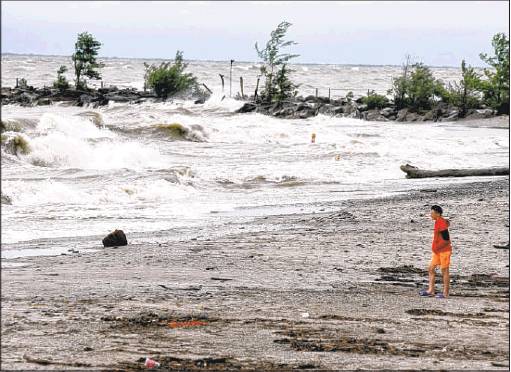Great Lakes water temps are blowing away records |
The abnormally warm waters, consistent with climate change trends in recent decades, could compromise water quality and harm marine life in some areas
Surfacewatertemperatures averaged over all of the Great Lakes, except the deep and choppy Lake Superior, have risen well into the 70s, while Lake Erie has flirted with 80 degrees.That’saboutthesame water temperature as the surf off Virginia Beach, Va.
These water temperatures over the lakes are some 6 to 11 degrees warmer than normal.
Here is how warm each of the lakes has become over the past week:
Lake Superior average water temperature reached 55.8 degrees on July 8, over 6 degrees above normal.
Lake Michigan’s average water temperature reached 75.1 degrees on July 8, nearly 11 degrees above normal, and the warmest mark on record so early in the year.
Lake Huron’s average water temperature reached 72.2 degrees on July 9, nearly 11 degrees above normal, and the warmest mark on record so early in the year.
Lake Ontario’s average water temperature reached 77.1 degrees on July 10, over 10 degrees above normal.
Lake Erie’s average water temperature reached 79.6 degrees on July 10, over 8 degrees above normal, and the warmest mark on record for any month.
The unusually warm water is a reflection of blistering heat over the Great Lakes region in recent weeks set up by a persistent ridge of high pressure.
The heat has meant water temperatures are “abnormally high compared to the most recent years,” said Andrea VanderWoude, manager of the Great Lakes CoastWatch program at the National Oceanic and Atmospheric Administration. “Last year was really cold and there was a lot of rain.”
The water temperatures spiked late last week before a weekend cold front unleashed windy, stormy weather which helped draw deep, cold water back toward the surface of the lake, in a process known as upwelling. This has caused water temperatures to drop slightly.
But VanderWoude expects they will rise again. Historically, water temperatures in Great Lakes reach their maximum in August.
Some residents are rejoicing in the unusually warm water. “I’m loving this,” said Whitney Miller, a Traverse City, Mich.-based swim instructor.
But the warm water could have detrimental effects on water quality and some aquatic species.
VanderWoude said NOAA aircraft have already photographed blue-green algae or cyanobacteria over western waters of Lake Erie in recent days. The foul-smelling algal blooms can harm fish and make people who are exposed to the water sick.
The jump start to the algal bloom due to the warm water temperatures means it will be around for several weeks longer than normal.
The warm water can have other detrimental effects for fish, said Richard Stumpf, an oceanographer with the NOAA. “Many fish do not do well in water that is too warm, so they get ‘squeezed’ into a smaller and smaller area between surface water that is too warm, and bottom water that doesn’t have enough oxygen,” he said.



 RSS Feed
RSS Feed